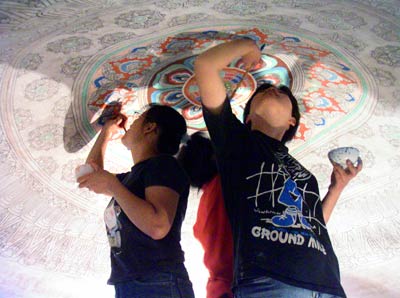Starting next year, artists from home and abroad may apply for a
chance to paint in newly-constructed caves near the world renowned
Mogao Grottoes in Dunhuang, northwestern Gansu Province.

At present, more than 20 caves have been opened and five were
set aside for artists to paint and carve, Chang Jiahong, painter
and head of the New Dunhuang Modern Grottoes Arts Center said at
the China Sciences and Humanities Forum on Wednesday.
Artists, drawing inspiration from the themes of "world peace"
and "global environment," may log on to the website (www.newdunhuang.com) to file
their applications. A special evaluation group organized by the
arts center will review the applications, and those selected will
be invited to live and work in the grotto, Chang told Xinhua.
He said the works could either be a single painting or carving
for a whole cave. "All the living expenses will be covered by the
arts center," he added.
The new grottoes, which are built underground, are designed for
arts creation. They will be free to visitors in the future, Chang
said.
Chang Jiahuang is the son of Chang Shuhong, the renowned
specialist of Dunhuang studies, also known as "the protector of the
Dunhuang caves." With donations and volunteers' help, Chang
Jiahuang poured money earned by selling his paintings into the
project to fulfill his father's last wish of building new caves in
Dunhuang.
He and the volunteers have been working in four caves since 1999
to duplicate Buddhist painting masterpieces that were looted by
foreign countries between 1906 and 1919. "The project's goal is to
boost modern arts through the traditional art form of grottoes," he
said.
The art objects of Dunhuang came to light in 1900 when a Taoist
named Wang Yuanlu stumbled into one of the 492 caves at Mogao
Grottoes that contained more than 50,000 sutras, records, and
paintings covering a period from the 4th to the 11th centuries.
The Mogao Grottoes were included by the United Nations
Educational, Scientific and Cultural Organization (UNESCO) on the
World Heritage List in 1987.
(Xinhua News Agency December 6, 2007)